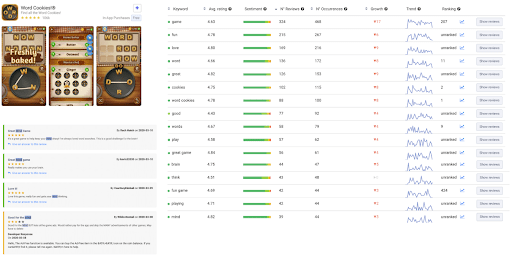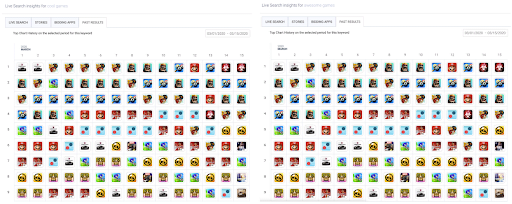This is a guest post by Alexandra De Clerck, Growth Marketing Manager at AppTweak.
App store algorithms become more and more sophisticated and complex. Previous research and tricks might not have the same impact anymore as they used to. Nevertheless, app store keyword optimization is still a crucial part of your ASO strategy.
How do you do keyword research for app store optimization? Every app store keyword research starts with building a comprehensive list of keywords that are relevant to the functionality of your app. This could involve brainstorming, reading competitors, app descriptions, analyzing app store’s auto-suggestions, etc. But to really make a difference you need to take your ASO keyword research one step further. Discover below our five tips to find new keyword opportunities for your app:
1. Analyze your current performance to prioritize your app store keyword research
Before diving into researching new keyword opportunities or understanding app store search behaviour in your category you need to have a look at your app’s current ranked keywords. Not only will this step uncover low hanging fruit, it is a critical step to help you prioritize your keyword research.
Example: Daily Yoga – US Apple App Store
Daily Yoga is today the most popular Yoga app ranking in the first position for the keyword ‘yoga’. In their metadata, they have targeted other high volume keywords like ‘workout’, ‘fitness’, ‘weight loss’, and ‘meditate’. Despite being a popular app, they do not manage to rank top 10 for these competitive keywords, hence they are not receiving any downloads from these.

When digging deeper, we do see that Daily Yoga ranks for a few relevant long-tail combinations, but these have low volume (with the exception of ‘yoga workout’).

This research unveils that Yoga Daily does not have enough authority to rank high on popular keywords like ‘fitness’, ‘weight loss’, or ‘meditate’. Instead, Daily Yoga should focus their keyword research on other keywords more related to the yoga field such as ‘stretching’ or ‘yoga poses’.

2. Explore your competitors top-ranked keywords and get new ideas
Taking the time to carefully research your competitor’s ranked keywords can uncover interesting insights into their ASO strategy. Some of these learnings might be relevant for your app and likely give you great ideas for your keyword research.
Example: Uber Driver – US Apple App Store
When using AppTweak to analyze the Uber Driver app’s ranked keywords we noticed that the app ranks for keywords related to several job boards such as Zip Recruiter or Indeed. The Lyft Driver app on the other hand is completely unranked for these keywords. Is Uber actively targeting these keywords in their keyword field? Since the keyword field is hidden, we cannot be certain about that, but it is a very interesting route for Lyft to investigate in order to increase the visibility of their own driver app. (Note, Apple states in their policy to not use unauthorized or trademarked terms).

3. Find gaps and target keywords strong competitors are not ranking on
Competitor keyword research for app store optimization will also help you identify valuable gaps that you can leverage. If you are competing in a very popular category, this research will unveil relevant keywords for which your competitors are not targeting, leaving room for your app to reach the top search results.
Example: Audiomack – US Apple App Store
The Music Category is dominated by very powerful apps like Spotify, Amazon Music, Pandora, Youtube Music and many more. Audiomack has done a great job to optimize its app for keywords that main competitors lack visibility on such as ‘rap music’, ‘hip hop music’ and ‘unreleased music’.

These keywords have a lower volume but also a lower difficulty score. As a result, AppTweak estimates that Audiomack receives more downloads from ranking #1 on ‘unreleased music’ than ranking #7 on ‘music streaming’. To learn more about how AppTweak estimates organic downloads per keyword, read this post.

4. Read reviews to understand how users describe your app
Carefully reading user reviews will provide more insights into what keywords users are typing to describe your app. This is a very important step in your app store keyword research that can provide unique insights for your ASO strategy.
Example: Word Cookies – US Apple App Store
AppTweak’s Review Sentiment tool unveils that users use the term ‘mind’, ‘brain’, or ‘think’ when reviewing Word Cookies.

When we add these keywords to AppTweak’s keyword tool we notice that they have great volume and that Word Cookies is currently unranked for these keywords. It would be very interesting for Word Cookies to further research keywords related to ‘mind’ or ‘brain’ and try to optimize its metadata for the most relevant long-tail keywords.

5. Focus on keywords that describe your app’s functionality
Once you have built your keyword list you need to allocate some time to clean up your list and remove irrelevant or very general keywords. This is a very important – but often overlooked – step. Both app stores want to provide the best user experience to their users and show apps in the search result that match the user’s intent. It is often tempting to target those keywords with the highest volume, but if these keywords do not clearly describe your app’s functionality, your chances to rank for those keywords are pretty low.
When researching keywords for gaming, keywords like ‘awesome games’, ‘5-star games’ or ‘funny games’ will likely make it into your keyword list. These are very tempting keywords to target as they have a very high volume. But very general keywords like these are extremely hard to rank for. Not only do they have a very high difficulty score, the rankings of these keywords are very volatile. We have also seen that trending apps (new games with a high download velocity, games that get a boost in advertising spend, games that get featured as ‘game of the day’ etc.) seem to occupy the top charts for these terms in most cases.
Let’s have a closer look. The live search results for ‘fun games’, ‘best games’, ‘cool games’ or ‘awesome games’ all looked exactly the same in the past 2 weeks, supporting our theory that these keywords are nearly impossible to manipulate. Apple seems to rank the most trending games for these keywords.

To summarize: App store keyword research takes time, but when done right it can unveil very interesting opportunities! To take your research one step further keep the following tips in mind:
- Analyze your current keyword performance performance to prioritize your keyword research
- Explore your competitors top ranked keywords and withdraw new ideas from their ASO strategy
- Find gaps and target keywords strong competitors are not optimizing for
- Read customer reviews to understand how users describe your app and use these insights to optimize your metadata
- Focus on keywords that describe your app’s functionality
If you want to find new keyword opportunities for your app, make sure to check AppTweak for actionable data and insights.
















